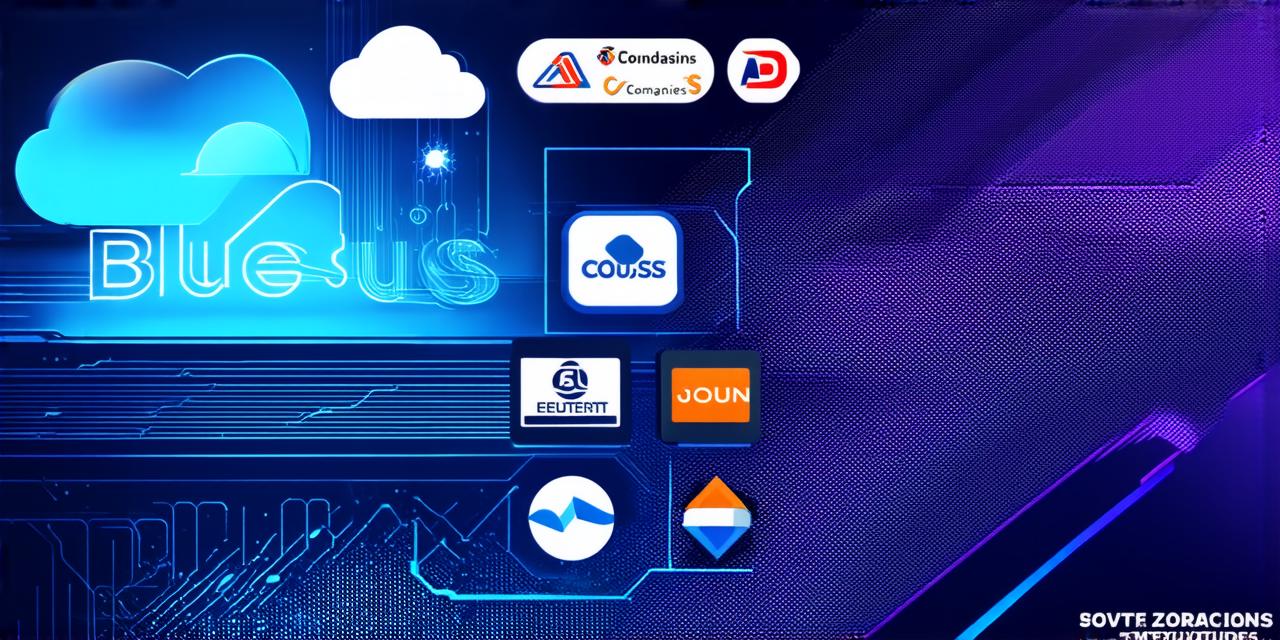In today’s fast-paced digital world, cloud computing has become an essential tool for businesses of all sizes. It allows organizations to store and process data remotely, reducing the need for on-premises infrastructure and providing greater scalability and flexibility.
Amazon Web Services (AWS)
Amazon Web Services (AWS) is a subsidiary of Amazon that provides on-demand cloud computing platforms and APIs to individuals and companies worldwide. AWS was founded in 2006, and it quickly became one of the leading players in the cloud market due to its wide range of services and scalability.
Some of AWS’s most popular offerings include:
- Elastic Compute Cloud (EC2): Allows users to launch virtual machines on-demand, with options for a variety of instance types and sizes.
- Simple Storage Service (S3): Provides secure and cost-effective object storage for data of all types.
- Amazon Relational Database Service (RDS): Offers managed relational databases that can be easily scaled up or down as needed.
AWS has also made significant investments in artificial intelligence and machine learning, providing services such as Amazon Comprehend, which enables developers to build intelligent applications using natural language processing, and Amazon Lex, a service that makes it easy to build conversational interfaces.
Microsoft Azure
Microsoft Azure is a cloud computing platform and set of services offered by Microsoft. It was launched in 2014 as part of the company’s shift towards cloud-based solutions.
Some of Azure’s most popular offerings include:
- Virtual Machines: Allows users to launch virtual machines on-demand, with options for a variety of instance types and sizes.
- Storage: Provides secure and cost-effective object storage for data of all types, including Blob storage, Queue storage, and Table storage.
- SQL Database: Offers managed relational databases that can be easily scaled up or down as needed.
Azure has also made significant investments in artificial intelligence and machine learning, providing services such as Azure Cognitive Services, which enables developers to build intelligent applications using natural language processing, computer vision, and other technologies.
Google Cloud Platform (GCP)
Google Cloud Platform (GCP) is a set of cloud computing services offered by Google. It was launched in 2011 as part of the company’s efforts to provide enterprises with scalable and secure cloud solutions.
Some of GCP’s most popular offerings include:
- Compute: Allows users to launch virtual machines on-demand, with options for a variety of instance types and sizes.
- Storage: Provides secure and cost-effective object storage for data of all types, including Google Cloud Storage and Google Cloud SQL.
- Big Data and Machine Learning: Offers tools and services for processing large amounts of data and building intelligent applications, including Google BigQuery and Google Cloud AutoML.
GCP has also made significant investments in hybrid cloud solutions, enabling organizations to seamlessly integrate on-premises infrastructure with the cloud.
IBM Cloud
IBM Cloud is a set of cloud computing services offered by IBM. It was launched in 2015 as part of the company’s efforts to provide enterprises with scalable and secure cloud solutions.
Some of IBM Cloud’s most popular offerings include:
- Compute: Allows users to launch virtual machines on-demand, with options for a variety of instance types and sizes.
- Storage: Provides secure and cost-effective object storage for data of all types, including IBM Cloud Object Storage and IBM Cloud SQL.
- Big Data and Analytics: Offers tools and services for processing large amounts of data and building intelligent applications, including Watson Analytics for Social Media and Watson Analytics for Customer Experience.
IBM Cloud has also made significant investments in blockchain technology, enabling organizations to build secure and transparent decentralized applications using the IBM Cloud Blockchain.
Comparing the Top Companies Leading in Cloud Computing
While each of these companies offers a wide range of cloud services, there are some key differences between them. Here’s a brief comparison of their strengths and weaknesses:
- AWS: AWS has a wide range of services and is highly scalable, making it an ideal choice for businesses with complex IT requirements. The company also has a large and experienced user base, which means there are plenty of resources available for users to learn from.
- Azure: Azure is known for its ease of use and user-friendly interface, making it an excellent choice for businesses that are new to cloud computing. The company also has a strong focus on security, with features such as Azure Security Center and Azure Active Directory to help keep data secure.
- GCP: GCP is known for its strong focus on innovation and cutting-edge technologies, with features such as Google Cloud AI Platform and Google Cloud Bigtable. The company also has a large user base of developers and businesses that are looking to build intelligent applications using the latest technologies.
- IBM Cloud: IBM Cloud is known for its strong focus on enterprise-level solutions and its deep expertise in areas such as blockchain technology and AI. The company also has a large user base of businesses that are looking to build scalable and secure cloud applications.
Selecting the Right Cloud Provider for Your Business
When selecting a cloud provider for your business, it’s important to carefully consider your specific needs and requirements. Here are some key factors to keep in mind:
- Security: Security should be a top priority when selecting a cloud provider. Look for providers that have strong security features such as data encryption, access controls, and regular security audits.
- Scalability: Your business’s IT needs may change over time, so it’s important to select a cloud provider that can scale up or down as needed to meet your changing requirements.
- Customization: Consider whether you need a high degree of customization when selecting a cloud provider. Some providers may offer more flexibility in this area than others.
- Cost: Cost is an important factor to consider, but it’s also important to remember that the cheapest option may not always be the best one for your business. Consider the long-term costs and the value you’ll get from the provider’s services when making a decision.
Summary
In conclusion, there are many cloud providers available in the market today. When selecting a provider for your business, it’s important to carefully consider your specific needs and requirements, as well as the strengths and weaknesses of each provider.


